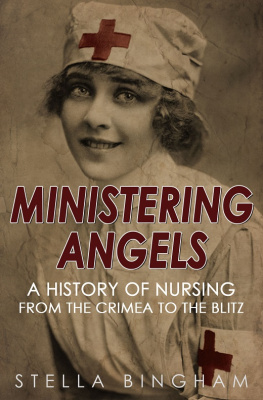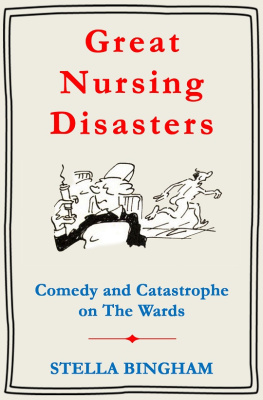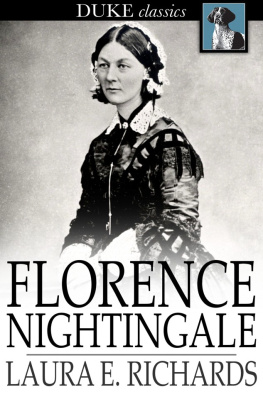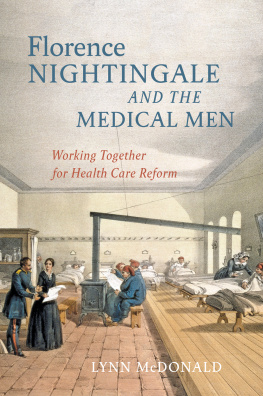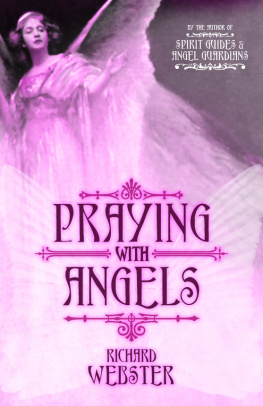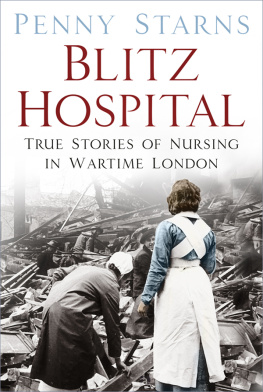1. In The Beginning
Women have nursed since the first mother gave birth to the first baby. Nursing has always been a womans duty, as much her responsibility as cooking, sewing and sweeping the floors: a domestic chore. Christianity made caring for the sick poor a work of charity, a penance, one of the most unpleasant jobs women (and men) could do to show their love of God. Even with the introduction of paid nurses one of the consequences of the Protestant Reformation, particularly in England things did not improve. The work was unpleasant, the hours killing, food and accommodation often poor, and wages low, and the sick poor got the sort of care they might have expected in such circumstances. Only in the last century did it begin to dawn on a few of the more enlightened doctors and social reformers that, with a little training, nurses might do more than care for a patient: they might help to cure. Womans oldest duty became her first profession.
While many ancient civilizations developed quite advanced systems of medicine and surgery and, particularly, of public hygiene and sanitation, women had only a small part to play in them. In the earliest days, medicine was inseparable from religion and superstition: medicine was magic, the priests were physicians and disease was the work of evil spirits. The functions of priest and doctor gradually separated but womens work was generally confined to midwifery and nursing at home.
Christianity made a sacred duty of loving your neighbour and caring for the sick, the old and the afflicted. Deaconesses, ordained by the laying on of hands, achieved a particularly important position in the Eastern Church. They had the same role as consecrated virgins and widows, who undertook specific functions within the church and devoted their lives to charitable work, which included sick visiting. In the early centuries such women lived and worked freely in society, but gradually they formed themselves in to communities and hence their spheres of activity were limited and curtailed. Care of the sick was a particular responsibility of the bishops who, from the 4th century A.D., built separate hospitals for their care. One of the earliest and most magnificent was built by Basil, Bishop of Caesarea, in A.D. 370. The Basilias, like such later foundations as the Htel Dieu at Lyons (542) and the Htel Dieu, Paris (about 650), combined the functions of hospital, almshouse, orphanage and hostel, as it was not thought necessary to make a distinction between the various objects of charity. The first hospital in Rome was founded in 390 by Fabiola, a wealthy widow who was converted to Christianity, and in expiation of her former life and an unhappy second marriage, lavished her fortune on the sick and the poor.
In 817, the Council of Aix declared the care of the poor to be the chief duty of monastic communities. However, a gradual transfer of part of this responsibility had been taking place since St. Benedict (born 480) had declared in his monastic Rule, Before all things and above all things care must be taken of the sick. The monastic life was particularly attractive to women as an alternative to marriage. The early nuns led free lives, most of them not even wearing distinctive dress. They were given the opportunity to develop their own interests, and many nunneries became centres of learning. The great double communities of monks and nuns were usually led by an abbess, often of the highest rank and ability. Hilda, Abbess of Whitby in the 7th century, was a kinswoman of the King of Northumbria. She trained many eminent monks and was a woman of national importance. The monasteries had wards for their own sick and many, particularly those belonging to the Benedictine rule, had separate buildings for travellers and the needy. Well-born ladies visited the hospitals to help care for the sick. The quality of medical care was low, but the spiritual tone was excellent.
By the 12th century, hospitals specifically for the sick were emerging as separate institutions. At the same time a number of religious orders were founded with the principal duty of nursing. In about 1050 a group of merchants from Amalfi, moved by the plight of the pilgrims pouring into Jerusalem , founded two hospitals in the Holy City. The one for men was under the protection of St. John the Almoner, the womens, St. Mary Magdalene. After the capture of Jerusalem by the Crusaders in 1099, the Order of St. John, which had devotedly nursed the soldiers during the Crusades, was endowed with generous gifts and lands from all over Europe. Under the second Grand Master of the Order the members took the Augustinian Rule and added military duties to their nursing work. The Hospitallers were divided into three grades: the knights who bore arms and held the important positions, the priests, and the serving brothers who probably did most of the nursing. The Order was rich and glamorous and membership eagerly sought after. Their hospitals were well equipped and run with a military discipline which strongly influenced later hospital management. When Jerusalem fell to the Saracens in 1187 and Acre followed in 1291 the Knights lost all their possessions in Palestine and the few left alive escaped to Cyprus. They took and held Rhodes from 1310 to l522 and then the Holy Roman Emperor Charles V gave them Malta, where they remained until the island was captured by Napoleon Bonaparte in 1798. The female branch of the Order, however, apparently gave up nursing after fleeing from Jerusalem. The German Teutonic Knights were formed to serve the sick and poor and defend the holy places. Their first hospital was destroyed when Jerusalem fell in l187, but they re-formed and nursed wounded Christian soldiers during the siege of Acre in 1190. After Acres capture, they built a church and hospital there but retreated to Venice and then Marienbad when the city fell finally into Moslem hands. Many hospitals in Germany were given to them.
The Knights of St. Lazarus undertook military duties as well as the care of lepers in Jerusalem, and elsewhere.
The oldest purely nursing order of nuns were the Augustinian Sisters of the Htel Dieu in Paris. By the 13th century they were completely enclosed under the control of the clergy, and only allowed to leave the hospital for visiting nursing. In 1212 a decree by the Bishops in Council instructed hospitals in France to use as few nursing sisters as possible in order to economize on the expenditure of charitable gifts, so the hospital was understaffed, the Sisters untrained, ill-fed and dreadfully overworked. The standard of nursing was fairly low, though some visitors commented on the Sisters cheerful loving manner. Periods of overcrowding saw as many as five or six patients in one large bed.
For centuries the clerical and civil powers fought over the administration of the hospital. Investigations led to reforms, and then to decline. In the 14th century there were reports of insubordination, insolence and moral scandal. In the 17th century the Sisters were accused of disobeying orders, neglecting the sick in favour of religious meditation, and selling drugs. Visitors at the end of the 18th century reported overcrowding, bed bugs, filth and insanitary conditions. Throughout, the Sisters, with justification, pleaded overwork. With the French Revolution came suppression of the Augustinian Order, though conditions were improved and the Sisters were allowed to remain as lay nurses.
The increasing decadence of the monastic orders led to the growth of secular equivalents, many of whom devoted themselves to nursing. The most interesting of the womens orders were the Beguines of Flanders, founded in 1180 as a protest against the more restrictive and artificial aspects of monastic life. They were vowed to chastity and obedience but could keep their own property and were free to leave the order and marry. The women lived together in threes and fours in small houses, grouped in a precinct, and nursed in hospitals and in the homes of the sick poor. The order spread to Germany, Switzerland and France and by 1300 it had about 200,000 members. Its independence made it unpopular with the Church, but the civil authorities and the people both gave it their support.

